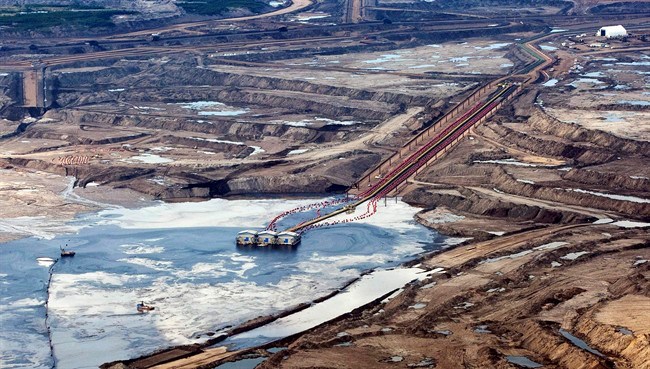So Canada’s federal government has finally approved construction of the proposed Enbridge pipeline to carry bitumen from Alberta’s oilsands to Kitimat, and thence by ocean to China.
If we do not go ahead, the prime minister warns us, Canada’s economy will be in grave danger.
“No country is going to take actions that are going to deliberately destroy jobs and growth in their country,” he declared a week ago in a joint statement with the prime minister of Australia.
But what if none of this is true? What if there were two possible directions that Canada’s future economy could take, not just one? What if there was another future built on clean technology, renewable energy, sustainable transportation and zero-carbon buildings, in which Canada could prosper without the oilsands, the unwanted pipelines, the fracking, the oil-polluted waters, the exploding trains, the waves of public opposition and the legal challenges from First Nations?
To Stephen Harper and his supporters, such a future is unthinkable. They would far rather we dwell on the danger of not exporting fossil fuels than the graver danger of a world that is four, five or even six degrees warmer due to the carbon released by the fossil fuels.
Our economy was so dependent on horses 120 years ago that unless something was done, we were warned, we would drown under a sea of horse manure. But change happened; we invented our way into a different world.
And change is happening again. The Age of Fossil Fuels is winding down. Around the world, financially viable oil is running out; investors are beginning to walk away. By 2030, it might all be over, and the Solar Age will take over.
Once upon a time, iron replaced stone. Then cars replaced horses. Today, renewable energy is replacing fossil fuels. The transition is upon us; you just need to know where to look. Young people are growing up who want a different world, with more sharing instead of debt; more community instead of commuting; more solar and wind energy instead of fossil fuels; more organic food and farming instead of chemicals; more cities with decent bike lanes and public transit instead of noise and stress; and more suburbs with decent light rail transit and railways instead of highway frustration.
In the Netherlands, thanks to investment in safe, separated bike lanes, more than 30 per cent of the Dutch use bicycles as their main mode of transportation, creating jobs by spending their money on culture and restaurants instead of fossil fuels.
In 1998, just 905 people belonged to car-share groups around the world. By 2012, that number had increased to 1.78 million.
In 2009, a mere 10,000 electric vehicles were sold globally. By 2013, the number had increased 20-fold. By 2020, the International Energy Association’s electric vehicle initiative expects to see 24 million EVs on the road.
In 1980, installed solar photovoltaic cost $100 a watt. Today, it costs $4. Before 2010, just 50 gigawatts had been installed globally. Today, global capacity is approaching 200 gigawatts. By 2020, if the price falls as predicted to $1.60 a watt, a solar tsunami will sweep the world.
In 2004, investors sank $54 billion into clean energy. By 2011, this had ballooned to $302 billion. By 2030, according to Bloomberg New Energy Finance CEO Michael Leibreich, clean energy will total 73 per cent of all global energy investments. Warren Buffett recently announced that he was doubling his $15-billion investment in renewable energy.
Another Canada is possible, in which our prosperity is driven not by oil but by investments in renewable energy; in which Ontario has become an electric-vehicles innovation hub; wind energy from Quebec, Ontario and Manitoba is being exported to cities in the U.S.; and British Columbia’s expertise in clean-tech innovation is being sought all over the world; a future in which we no longer spend billions every year subsidizing the oil industry and the money spent on renewable energy remains in Canada, supporting new business activity.
Renewable energy is not just clean — it will also never run out. The curtains will soon fall on the Age of Fossil Fuels. The Solar Age will last for as long as the sun sends us energy.
So the next time you hear a politician warning that if we don’t develop the oilsands and the pipelines, all hell will break loose, remember that there is an alternative. We have two options, not one.
Guy Dauncey is the founder and communications director of the B.C. Sustainable Energy Association.



